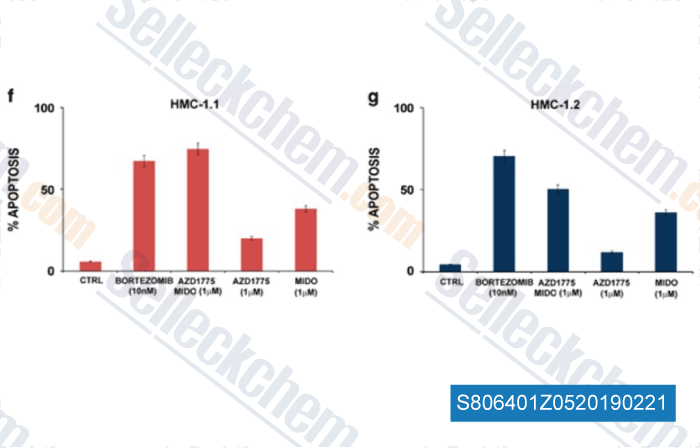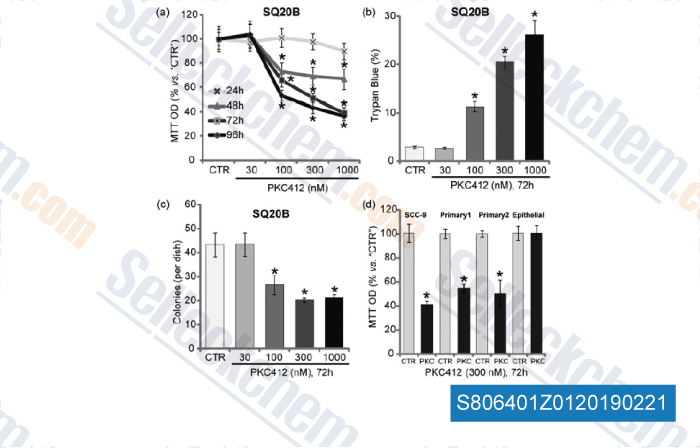|
Toll Free: (877) 796-6397 -- USA and Canada only -- |
Fax: +1-832-582-8590 Orders: +1-832-582-8158 |
Tech Support: +1-832-582-8158 Ext:3 Please provide your Order Number in the email. |
Technical Data
| Formula | C35H30N4O4 |
||||||
| Molecular Weight | 570.64 | CAS No. | 120685-11-2 | ||||
| Solubility (25°C)* | In vitro | DMSO | 100 mg/mL (175.24 mM) | ||||
| Ethanol | 2 mg/mL (3.5 mM) | ||||||
| Water | Insoluble | ||||||
| In vivo (Add solvents to the product individually and in order) |
|
||||||
|
* <1 mg/ml means slightly soluble or insoluble. * Please note that Selleck tests the solubility of all compounds in-house, and the actual solubility may differ slightly from published values. This is normal and is due to slight batch-to-batch variations. * Room temperature shipping (Stability testing shows this product can be shipped without any cooling measures.) |
|||||||
Preparing Stock Solutions
Biological Activity
| Description | Midostaurin is a multi-targeted kinase inhibitor, including PKCα/β/γ, Syk, Flk-1, Akt, PKA, c-Kit, c-Fgr, c-Src, FLT3, PDFRβ and VEGFR1/2 with IC50 ranging from 80-500 nM. | |||||||||||
|---|---|---|---|---|---|---|---|---|---|---|---|---|
| Targets |
|
|||||||||||
| In vitro | Midostaurin(pkc412) is a broad spectrum protein kinase inhibitor. Midostaurin(pkc412) interacts strongly with ATP binding sites of the conventional PKC-α, -β and -γ, PDGFRβ, VEGF-R2, VEGF-R1 and the cyclin-dependant kinase 1-cyclin B complex. Midostaurin(pkc412) inhibits the growth of various human and animal cell lines in vitro at similar submicromolar concentrations. Midostaurin(pkc412) also effectively inhibits the in vitro proliferation of glioblastoma and induced the accumulation of cells in G2/M and formation of giant nuclei with extensive fragmentation and apoptotic bodies. Midostaurin(pkc412) is able to reverse the p-glycoprotein-mediated multidrug resistance of tumor cells in vitro. [1] | |||||||||||
| In vivo | Midostaurin(pkc412) may suppress tumor growth by inhibiting tumor angiogenesis (via its effects on the VEGF receptor tyrosine kinases) in addition to directly inhibiting tumor cell proliferation (via its effects on PKCs). This anti-angiogenic action may contribute to the antimetastatic and broad antitumor activity displayed by midostaurin(pkc412), as well as the synergy with cytotoxic agents, including doxorubicin, cyclophosphamide, cisplatin and gemcitabine. When given orally, the maximally tolerated dose for midostaurin(pkc412) is >300 mg/kg. [1] |
Protocol (from reference)
| Cell Assay:[2] |
|
|---|---|
| Animal Study:[1] |
|
References
|
Customer Product Validation

-
Data from [Data independently produced by , , Leukemia, 2018, 32(1):139-148]

-
Data from [Data independently produced by , , J Cell Physiol, 2018, 233(12):9437-9446]
Selleck's Midostaurin has been cited by 57 publications
| RSK1 dependency in FLT3-ITD acute myeloid leukemia [ Blood Cancer J, 2024, 14(1):207] | PubMed: 39592591 |
| Unveiling the signaling network of FLT3-ITD AML improves drug sensitivity prediction [ Elife, 2024, 12RP90532] | PubMed: 38564252 |
| The Immunomodulatory Effect of Different FLT3 Inhibitors on Dendritic Cells [ Cancers (Basel), 2024, 16(21)3719] | PubMed: 39518156 |
| Activation of the receptor KIT induces the secretion of exosome-like small extracellular vesicles [ J Extracell Biol, 2024, 3(1):e139] | PubMed: 38938682 |
| Targeting FLT3 with a new-generation antibody-drug conjugate in combination with kinase inhibitors for treatment of AML [ Blood, 2023, 141(9):1023-1035] | PubMed: 35981498 |
| ABCC1 and glutathione metabolism limit the efficacy of BCL-2 inhibitors in acute myeloid leukemia [ Nat Commun, 2023, 14(1):5709] | PubMed: 37726279 |
| A combinatorial therapeutic approach to enhance FLT3-ITD AML treatment [ Cell Rep Med, 2023, 10.1016/j.xcrm.2023.101286] | PubMed: 37951217 |
| ABCC1 and glutathione metabolism limit the efficacy of BCL-2 inhibitors in acute myeloid leukemia [ Nat Commun, 2023, 14(1):5709] | PubMed: 37726279 |
| Comprehensive profiling of clinical JAK inhibitors in myeloproliferative neoplasms [ Am J Hematol, 2023, 98(7):1029-1042] | PubMed: 37203407 |
| Posttranslational splicing modifications as a key mechanism in cytarabine resistance in acute myeloid leukemia [ Leukemia, 2023, 37(8):1649-1659] | PubMed: 37422594 |
RETURN POLICY
Selleck Chemical’s Unconditional Return Policy ensures a smooth online shopping experience for our customers. If you are in any way unsatisfied with your purchase, you may return any item(s) within 7 days of receiving it. In the event of product quality issues, either protocol related or product related problems, you may return any item(s) within 365 days from the original purchase date. Please follow the instructions below when returning products.
SHIPPING AND STORAGE
Selleck products are transported at room temperature. If you receive the product at room temperature, please rest assured, the Selleck Quality Inspection Department has conducted experiments to verify that the normal temperature placement of one month will not affect the biological activity of powder products. After collecting, please store the product according to the requirements described in the datasheet. Most Selleck products are stable under the recommended conditions.
NOT FOR HUMAN, VETERINARY DIAGNOSTIC OR THERAPEUTIC USE.
